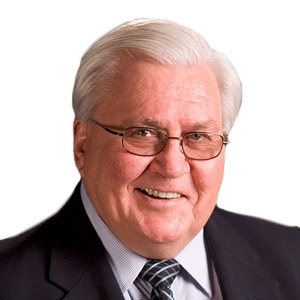Biography tells story of Nevada storyteller Robert Laxalt
CARSON CITY — “Robert Laxalt stared at the blank piece of paper in the Royal typewriter. He wrote a sentence, pulled the paper from the Royal and read it carefully. With both hands, he crumbled the paper in a ball and threw it in the wastebasket. The words weren’t right. They weren’t good enough.”
That’s how University of Nevada, Reno professor emeritus Warren Lerude begins his biography “Robert Laxalt: The Story of a Storyteller.” It also is a good imitation of how Laxalt (1923-2001) wrote — not with a lot of puffy descriptive prose, but with easy-to-understand words, especially with active verbs.
Like Ernest Hemingway, Laxalt grew up as a newspaper reporter who learned after work in front of his typewriter to become a real writer. He worked for the old United Press and created his own news service in Northern Nevada in the early 1950s.
To supplement a meager income, Laxalt began writing longer freelance pieces and short stories for magazines.
Then in 1957, Harper & Row published his book “Sweet Promised Land,” an account of the trip he and his sheepherder father, Dominique, took to the Basque country in France, which the senior Laxalt had left almost 60 years earlier.
The poignant tale describes how Dominique would discover he no longer was an immigrant who missed the Basque, but an American who loved the mountains outside Carson City. In turn, Robert discovered a love for his father that he previously did not really have.
The book remains a classic. It made Laxalt Nevada’s Hemingway and led to a 50-year career in which he published 17 books, some of them semifictional accounts of his family, and he arguably became the greatest writer Nevada has produced.
Others might prefer Walter Van Tilburg Clark of “The Oxbow Incident” fame, but Laxalt’s style was far more readable.
“People know Bob as a great writer, but they don’t know where he came from,” Lerude said. “He came out of journalism, and he never really left journalism. There was no biography about Bob, and in a weak moment I decided to do it.
It took Lerude 4½ years to write the biography. His research included looking through 33 boxes of material Laxalt left to the UNR library.
More than a biography, the book shows how Laxalt became a writer. Lerude, 75, critiques many news stories Laxalt wrote as a young reporter and then the dozens of magazine pieces, short stories and finally nonfiction books and novels he published the following decades.
Although a friend of Laxalt, Lerude does not hesitate to mention books and stories that were not as good as others.
Lerude’s solid credentials lend credence to his criticism. He won the 1977 Pulitzer Prize for editorial writing when he was a Reno newspaper editor. He went on to a second career as a journalism professor at the Reynolds School of Journalism at UNR.
This summer, Lerude is finishing up his final UNR duties overseeing interns. His next step is retirement. Give him a few months, and he might try another book.
Forty years ago the Laxalts were Northern Nevada royalty. His brother Paul, who turned 91 on Aug. 2, had been Nevada’s governor and was planning a 1974 bid for the U.S. Senate. He would serve 12 years in the Senate and even run briefly for president in 1988.
Other brothers in the family were lawyers; a sister was a nun. Robert Laxalt by then had been a spokesman for UNR and founded the university’s book publishing operation, called University of Nevada Press.
Today, in a state where 80 percent of the population is from someplace else, the Laxalts largely are forgotten. More than a few visitors to this historic city have asked why a state office building near the Capitol is called the Laxalt Building, after Paul Laxalt.
Politics is ephemeral. But what never will be lost are the words of Robert Laxalt.
“Sweet Promised Land” became a Weekly Reader book for schoolchildren by the early 1960s.
Children across the country loved it then, and the new Kindle generation of readers cannot help but experience the same awe when they read those beginning words:
“My father was a sheepherder, and his home was the hills.”
Lerude said the popularity of Robert Laxalt’s book may have been why his brother won a seat in the Senate.
During the 1974 campaign, the family commissioned the publication of 30,000 reprints of “Sweet Promised Land.” Robert Laxalt added a short section in which he introduced his brother to voters.
Paul Laxalt won the race over Harry Reid by 611 votes, a margin some political pundits attributed to the popularity of the book, according to Lerude.
“Paul was the most prominent Laxalt in his time, but times change,” Lerude said. “The most enduring Laxalt is Bob.”
Lerude only briefly mentions his 40-year friendship with Laxalt in the book. When he heard of his friend’s death, he went skiing and made sure to cover over some of the lands where Dominique Laxalt had herded sheep 50 years earlier. Robert and Dominique could have been watching.
The book was published by the Center for Basque Studies at UNR. Copies are $24.95 and can be purchased through the center’s website at http://basquebooks. myshopify.com/.
The book also soon will be available at larger bookstores and at amazon.com, along with his other works.
Contact Capital Bureau Chief Ed Vogel at evogel@reviewjournal.com or 775-687-3901.




























